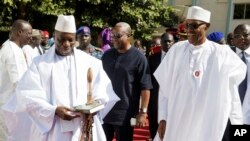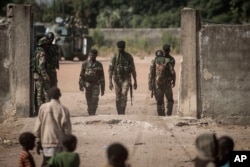Defeated Gambian President Yahya Jammeh has agreed to relinquish power and leave the country, according to incoming President Adama Barrow.
Jammeh spoke early Saturday on state television, saying “I think it is not necessary that a single drop of blood be shed.’’
Jammeh's decision came after Guinean President Alpha Conde and Mauritania's President Mohamed Ould Abdel Aziz arrived together in Banjul early Friday to convince him to cede power and leave the country or face military action.
Jammeh did not give details on any deal that was struck, and it is not clear when Barrow will return from neighboring Senegal to take power.
A State House official close to the situation says Jammeh would leave within three days, possibly Saturday with Conde. The official spoke on condition of anonymity because he was not permitted to speak about the situation to the press.
Barrow took the oath of office Thursday at the Gambian embassy in neighboring Senegal after not being able to be sworn in at the Gambian capital.
Red carpets were reportedly rolled out at the airport in Banjul in what appeared to be preparations for Jammeh's departure.
Also on Friday, Gambian defense chief Ousmane Badjie pledged his allegiance to the country's new president.
The West African leaders gave Jammeh until midday local time to relinquish power, the 15-nation Economic Community of West African States (ECOWAS) said.
After the deadline was imposed, Jammeh asked for a four-hour extension to cede.
ECOWAS Chairman Marcel Alain de Souza said Conde would offer Jammeh the chance to cede authority peacefully. "If that fails, we will bring him by force or by will," he said.
The United Nations Security Council had earlier approved a military intervention and recognized Adama Barrow as the new president.
On Thursday, U.S. President Barack Obama's State Department spokesman, John Kirby, said the U.S. supported the West African force "because we understand that the purpose is to help stabilize a tense situation and to try to observe the will of the people of Gambia."
Kirby said the U.S. had no plans to send in any U.S. troops.
The U.N. Security Council unanimously backed a Senegalese-drafted resolution condemning "in the strongest possible terms" attempts to prevent a peaceful and orderly transfer of power.
Council President Olof Skoog, the Swedish ambassador, said he personally spoke to President Barrow to tell him he has the council's full support.
Council members Egypt, Uruguay and Bolivia stressed that the resolution in no way authorizes military force to install Barrow as president.
ECOWAS and the African Union Peace and Security Council have called in separate communiques for "all necessary measures" to be taken to respect the will of the Gambian people regarding the election outcome. In diplomatic language, that often means the use of military force.
The United Nations refugee agency, meanwhile, said Friday that tens of thousands of Gambians were fleeing the country amid the standoff. Spokesman Babar Baloch told reporters in Geneva an estimated 45,000 people had reportedly fled to Senegal in recent days and said there is the possibility of many more to follow.
Barrow won the country's election December 1. Jammeh, who once vowed to rule Gambia for "a billion years," initially accepted the results, but changed his mind, citing alleged voting irregularities.
Until Friday, he had refused to give up power, declaring a state of emergency and ramming a meaningless three-month extension of his mandate through parliament.
Amnesty International and other major human rights groups have accused Jammeh of having little tolerance for dissent. They say he has killed or jailed many opponents. He also has threatened to murder homosexuals and once ordered the kidnapping of more than 1,000 villagers accused of being witches.





